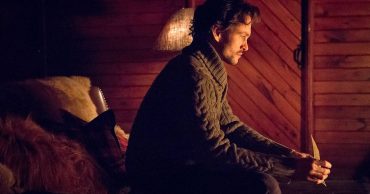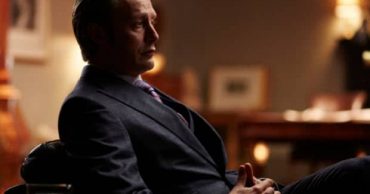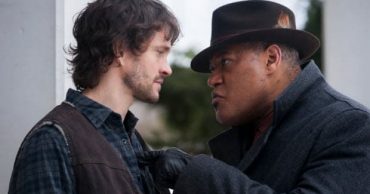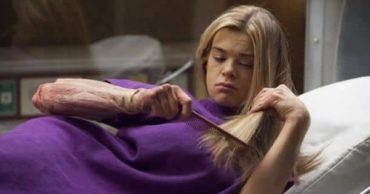
For a series whose episodes are often purposefully slow, Hannibal has executed several tense sequences in the past couple entries, including the race to find Hannibal at the end of “Mukozuke.” Something like this provides a bit of a tonal contrast from the other 35 minutes, and yet a lot of the sequence itself falls in line with how Hannibal tells its story, moving carefully and methodically rather than going full-blown thriller. The orderly Admirer opts to have a conversation with Hannibal before letting him bleed out or kick the bucket, and instead of Hannibal trying to anxiously wiggle his way out of the situation–either literally or figuratively–he plays the game. Last week, when speaking with Bella, Hannibal talked about his attitudes toward death, saying that it is something he accepts, which allows him to see the beauty and horror in life. Here, his personal philosophy is mostly proven right, since his appeal to the Admirer seems more like a way to explain who Will Graham is (or isn’t) than a desperate clutch at straws to save his own life. Hannibal can’t die yet, of course, but it’s easy to imagine a different universe in which Jack and Alana don’t come to the rescue and we see both life and death through Hannibal’s perspective as he relinquishes himself to the transition, hanging or fading away.
This kind of consistency with ideals is important for Hannibal to maintain, otherwise it creates a series of mixed messages. That’s obviously something that’s difficult to avoid when Hannibal is someone who specializes in crafting a facade, but as an audience, we should be able to understand these characters based on the information we’ve been given. That idea is what makes the beginning of this episode so difficult to watch. Jack Crawford finds himself in an unfortunately familiar situation, going to that observatory to find the remains of a dead colleague. Laurence Fishburne has been given plenty of heavy material in these two most recent episodes, and he’s hit every note perfectly, evoking every bit of despair that runs through Jack as he tries to deal with a dying wife, an incarcerated friend, a serial killer on the loose and now a murdered ally in every sense. In a show of great respect for her contribution, “Mukozuke” takes the time to grieve for Hettienne Park’s Beverly Katz by experiencing her loss through Jack, Jimmy, Brian and Will. Her death means something different to each of these people, and the scenes we get with them are all consistent with what we know about each character.
And yet, as we see these events unfold, one character is clearly on the precipice of change. Will is becoming someone we don’t recognize–someone who is less consistent after the catalyst of Beverly’s death. We don’t get to see every character’s reaction to this, but we get a few who have some opinions about Will becoming a murderer by proxy. Unfortunately, Hannibal’s reaction is amid his near-death scene, so there’s not much time to interpret it, but I can imagine it’s a reaction of mixed feelings. He is most certainly surprised that Will is capable of the deed, but I would assume there’s also some strange tinge of pride that Will could be pushed to become someone who is more similar to Hannibal than the empathetic man Hannibal first met. Alana’s reaction, though, is probably the most worrying for me, with severe implications going forward. Though she’s been reluctant to believe what Will is saying about how he’s been set up, she’s helped him to attain some semblance of sanity and completeness by opening up his memories. And, of course, she’s done all of this while trying not to let her love for Will take over. She’s believed in him. Now, it would make perfect sense to see the act of convincing the Admirer to kill Hannibal as a kind of betrayal from Alana’s perspective. At the very least, it is some sort of dividing force that will take a lot of time for Will to come back from.
I wonder if the decision to kill Hannibal is convincing, though. Will has only pulled the trigger when he’s been forced or manipulated to. It’s another thing to suggest that Will is so bent on revenge that he’d orchestrate the man’s death. This certainly comes down to how individual viewers’ own beliefs and attitudes resonate with Will’s actions, but even Beverly’s death didn’t seem like enough to turn Will into a second-hand murderer. Part of the trouble there is that I can’t make sense of the image of Will’s sink filling up with blood. We see the drops of water change, and that’s not the only time water is used in the episode. Early on, Will is sitting down with Jack and Alana while the sound of running water plays over the scene. It felt like Will was trying to get into the river of his mind again but that events had become so disturbing–or that his guilt was weighing down too heavily–that there was no way to enter it. So, the blood in the sink acts as a parallel to that. But when the blood is first shown to be dripping, the episode transitions to a shot of Hannibal’s blood running down the drain at the pool, providing a visual suggestion that Will is seeing Hannibal’s blood in his sink. Will can’t know that his plan has failed, which might explain why the blood continues to flow. But I take that image more to be something that shows Will has made the wrong choice–that the blood functions like how it does in the phrase “blood on your hands.” The episode ends there, focusing on Will’s face, so we can’t know what he’s thinking. However, I would have a hard time believing that the feeling Will would experience from Hannibal’s death would be one of uncomplicated satisfaction.
The other image in “Mukozuke” that goes unexplained is that of Beverly’s divided corpse. When Will goes through the stages of re-enacting the murder, he says that the killer laid the layers out as Beverly would a crime scene. Knowing both Hannibal and Hannibal, there’s got to be more to it than that. There’s something about the layering that’s important for Hannibal to communicate to Will, perhaps tying into how Hannibal has peeled back layers of Will and left him nothing but the barest version of himself. It’s almost out-of-character for the show that Hannibal isn’t there to see what’s happened and to comment on what the killer’s intentions might have been or what his twisted worldview is like. The information we learn about the kidneys is similarly curious. Hannibal hasn’t gone into the nature of the titular character’s cannibalism. Often, we see him eating pieces of his victims. Yet, given that Hannibal is someone who cares deeply about the how and why of things, shouldn’t we assume that he has certain standards when consuming parts of people? Is eating them a way of exerting superiority over a lesser person? Or does he eat only the strong ones in a ritualistic way to ingest their powerful essences? We learn that he’s kept the Muralist’s kidneys, but that he hasn’t eaten them. Instead, he eats Beverly’s, and after hearing from Hannibal how much of Will Graham he sees (or saw) in Beverly, the act is also almost a substitute for eating Will. In any case, there is a certain perversion in replacing Katz’s kidneys with that of a serial killer, and I’d be interested to read other people’s thoughts on all this.
“Mukozuke” is absolutely the beginning of the long descent into that kitchen scene we saw in the season premiere. Will is careful to not tell Jack that he believes Hannibal has killed Beverly. He wants Jack to arrive to that conclusion on his own, which he know he will by the end of the season (or perhaps even sooner, having a few episodes be devoted to collecting further evidence and making sure the case against Hannibal is rock solid). Before this episode, I might have been worried about keeping Will behind bars and giving so much of each episode’s attention over to him, since contriving reasons for characters to meet with him might have become repetitive. But now that Abel Gideon has become an asylum mate of Will’s, there’s more to those scenes that can be done without a visitor from the FBI. I also especially like the use of Freddie Lounds in “Mukozuke,” who does such a good job at being bad that it’s a wonder she makes it all the way to Red Dragon without getting killed (although, Fuller could decide to off her before that story, and Hannibal’s stare is enough to make me believe that could happen). Alana, too, returns in a larger capacity than in the previous three episodes, and if I were a betting man, I’d expect to see a lot more of her for a few weeks as she struggles with the knowledge of Will’s lapse in judgment. Hopefully, she’ll lose those boots so that she can run a little better, though.
[Photo via NBC]
 Follow Us
Follow Us





